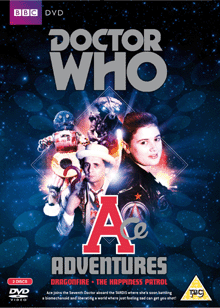 Some Doctor Who stories will always be more acclaimed than others. But one story that has deserved rather more acclaim than it has been accustomed to getting is 1988’s The Happiness Patrol.
Some Doctor Who stories will always be more acclaimed than others. But one story that has deserved rather more acclaim than it has been accustomed to getting is 1988’s The Happiness Patrol.
Made at a time when producer John Nathan-Turner was getting it in the neck from fans and BBC bigwigs alike for his perceived light entertainment approach, the story must have felt like it was cocking a snook to fans who lamented so much ‘eyes and teeth’ showmanship in their favourite show.
The Happiness Patrol, as its title suggests, isn’t exactly short of ‘gayness’ in either its former or modern meanings. Terra Alpha is a candy-floss confection of a world where faded dolly birds patrol the streets, one character (Susan Q) is named after a dance step, and butchness – as evinced by the male of the species, at least – is in short supply.
Harmonica-playing outsiders may be allowed their air of jazz-cool, but the resident male population conform to a more archly theatrical type. It’s a chance for a certain type of BBC thesp to unleash their inner grande dame. But it’s a tall ask to expect viewers, flicking over from Rita Fairclough and Alan Bradley on the other side, to sit around long enough to grasp the intentions of the satire.
However, time has been good to The Happiness Patrol, and, more than any other story of its era, it’s still creating ripples to this day – online, in the Newsnight studio, in Canterbury Cathedral…
Clearly, in these days of life coaching, ‘Broken Britain’ and moral uncertainty, happiness is firmly on the agenda. But the story owes its current renaissance to more than just a new-found topicality. It’s also genuinely, really, rather good.
In the world of Who fandom, of course, there have long been dissenters against the orthodoxy – quiet pockets of resistance who have sought to articulate the dark heart at the story’s fondant centre, while quietly apologising for its more garish elements, such as the polyester wigs and Kandy Man. It’s no biggie any more to rush for the Dictionary of Critical Terms while praising the story for its ‘Kafkaesque’ and ‘dystopian’ satire on Thatcherism.
But visiting the story again, it’s clear that it doesn’t need the apology of a narrow textual reading. As a science fiction parable, it works, and even the broader elements are good fun.
Take the infamous Kandy Man. The scenes in the Kandy Kitchen are a twisted fusion of Roald Dahl and Chitty Chitty Bang Bang – two entirely legitimate influences for a Doctor Who story – and the Kandy Man himself, accompanied by Dominic Glynn’s Wurlitzer-style music, has aged a great deal better than other monsters of the period: the Tetraps of Time and the Rani or the Biomechanoid of Dragonfire.
In the commentary accompanying this story, it is revealed that, when initially interviewed for the DVD, scriptwriter Graeme Curry’s response was to question why it was being released at all, given how little people liked it.
Curry should have had more faith in his own work. There are problems with The Happiness Patrol, but they’re not weaknesses in vision or approach. They’re the effects of institutional neglect: a cheap-as-chips studio system that increasingly wasn’t up to the job of making drama of this kind.
No, looking back, it’s clear that for Doctor Who to become the show it needed to be, it wasn’t Doctor Who that needed to change. It was the BBC.
![]()
Extras: Several years ago, a friend of this reviewer rang him to say, ‘I’m working with someone at QCA who used to write for Doctor Who. His name’s Graeme Curry.’ Could it be true? Could the poacher who satirised government and bureaucracy have really turned gamekeeper by working for the Qualifications and Curriculum Authority?
Sadly, the DVD stays quiet on the answer. But from the two documentaries included here, it’s clear that Curry and script editor, Andrew Cartmel, are still Lefties at heart.
The showcase feature, When Worlds Collide, is a documentary on the politics of Doctor Who, which takes in such subjects as the depiction of pacifism in The Daleks (1963) and the satirical treatment of the Iraq War in World War Three (2005). It’s a thoughtful piece, authored by fan writer, Nick Pegg, which is willing to entertain controversial views – that Pertwee’s Doctor wasn’t an establishment figure but was reactionary.
Discussion of the 2010 news report that The Happiness Patrol was used to promote anti-Thatcher bias makes it a natural fit for this release, and there’s more discussion in this vein on both the making of documentary, Happiness Will Prevail, and the commentary.
A year ago, 2entertain ran a Twitter competition for Doctor Who viewers to submit questions to be posed during the commentary session for The Happiness Patrol. In the event, only one of these questions is included – and it’s a pretentious one at that – leaving instead space for Sophie Aldred, Curry, Cartmel, Dominic Glynn and director Chris Clough to talk up a storm in a commentary that references Pinochet, the Archbishop of Canterbury and even the Arab Spring.
Alongside a comprehensive package of deleted and extended scenes, and intriguing behind-the-scenes production footage included on the Making Of documentary, it makes for a comprehensive package, and one that does full justice to a story that may finally be coming into its own.
![]()
Released on DVD on Monday 7th May 2012 by BBC Worldwide.
> Buy the Ace Adventures boxset on Amazon.
What are your memories of The Happiness Patrol? Let us know below…

